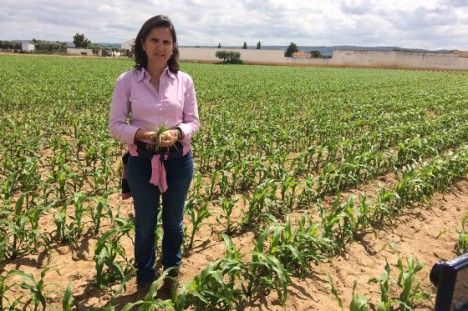Portuguese farmer experiments with cover crops to suppress nutsedge
 Operational Group combats weeds with non-chemical alternatives – Agriculture in the EU and worldwide has become increasingly dependent on the use of pesticides.
Operational Group combats weeds with non-chemical alternatives – Agriculture in the EU and worldwide has become increasingly dependent on the use of pesticides.
Change is needed because the use of these chemicals can impact the environment and the health of animals and humans. Inspired by results in other member states, the Portuguese Operational Group HortInf is trying to find non-chemical alternatives to conventional weed management that could be used by Portuguese farmers.
One of the farmers involved in this project is Francisca Chaves Ramos. For 10 years she has been primarily cultivating potatoes, corn, and barley in Golega, in the center of Portugal. “I had already been struggling for a while with the chemical weed management on my farm. When my children started asking why I was using harmful chemicals on the farm, I answered that there aren’t any suitable alternatives for farming in large areas. When farmers` organization AgroMais Plus approached me to join this project, I immediately said yes.”
Perennial weeds like nutsedge (Cyperus rotundus and Cyperus esculentus) multiply through bulbs, rhizomes (root stalks) and root sections. Traditional mechanical weeding methods actually help to create more rhizomes that propagate these weeds instead of eliminating them. Francisca: “At my farm approximately 90% of the weed control is done by chemicals. Right now, in the context of our Operational Group project, we are looking for ways to use cover crops to suppress the nutsedge. This is interesting, because I didn’t know this was possible before, and it may help us to reduce our chemical weed management. By the end of this project, I hope that the weed will be a little more under control, but it may take a long time to eliminate it completely. Every stage probably needs a different approach, so we have to be patient and keep believing in the solutions.”
Francisca is very positive about cooperation with the researchers. “It is great that we as farmers can help the researchers to test ideas in the field. This is always more useful than when you can only test it in the lab. Therefore, I think that every farmer should be willing to participate in cooperation like this.”
Isabel Calha is one of the researchers involved in the project. “Working with farmers allows us to discuss the limitations and constraints that we face while testing new crops or the introduction of new tillage equipment. It is important that we listen to their opinion to understand their expectations for this project. So for every new technology that we would like to test, compromise, commitment and confidence are necessary. This may take some time, but we eventually achieve better results.”
“We also learned to take more issues into account like access to equipment, costs and farmers’ perception about the advantages and disadvantages of each practice in the short and in the long term. Trials in the fields of the farmers are a good way to achieve these goals”, concludes Isabel.










